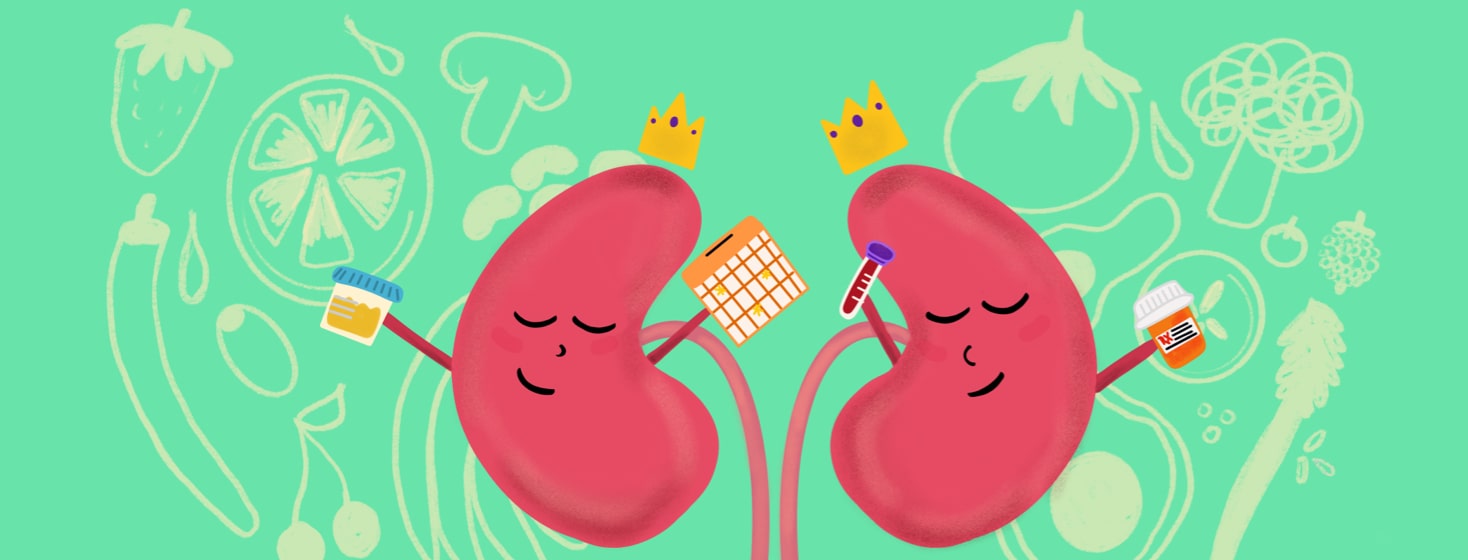Treating Rare Kidney Diseases
Reviewed by: HU Medical Review Board | Last reviewed: March 2024 | Last updated: April 2024
Many rare kidney diseases currently have no cure. However, there are treatment options that can help.1-3
There are several factors to consider when creating a treatment plan for a rare kidney disease. It may take a lot of time, change, and communication with your healthcare team to find the best plan for you.1-3
Overview of kidney disease treatment
The main goal of treatment for kidney disease is to manage symptoms and slow the progression of further kidney damage. Any reversible underlying causes of damage are also addressed. The first line of treatment is with medicines and lifestyle changes.1-5
Despite these treatments, kidney damage can become severe. At this point, kidney failure can occur. In these cases, in which the kidneys cannot do their job, dialysis or a kidney transplant is necessary.1-3
Blood pressure drugs
Kidney diseases can impact your blood pressure. High blood pressure can also cause further damage to your kidneys. To reduce this cycle and help the kidneys continue to function, doctors often prescribe blood pressure drugs. Examples of these drugs include:1-6
- Angiotensin-converting enzyme (ACE) inhibitors – ACE inhibitors reduce blood pressure by widening blood vessels, reducing hormones that raise blood pressure, and helping your kidneys get rid of excess water.
- Angiotensin receptor blockers (ARBs) – ARBs lower blood pressure by widening blood vessels. This makes it easier for kidneys to do their job.
- Beta-blockers – These medicines block adrenaline, a hormone that causes your heart rate and blood pressure to rise.
- Diuretics – These are water pills that help you pee more. By peeing more, you are helping your kidneys flush out extra salt, fluid, and waste in your blood.
Drugs that turn down the immune system
Some rare kidney diseases are caused by autoimmune issues. In some cases, the body mistakenly attacks its own healthy tissue. Lupus nephritis and some forms of Complement 3 glomerulopathy (C3G) are examples of autoimmune rare kidney diseases.2,3,6,7
In certain cases, people have immune systems that do not regulate properly. This is the case in people with conditions like IgA nephropathy (IgAN) and other forms of C3G (dense deposit disease). Immune system proteins build up in the kidneys over time, leading to damage.2,7,8
Corticosteroids (commonly called steroids) and other drugs that suppress the immune system can help decrease kidney damage caused by these conditions. Newer, targeted immune therapies may also help manage these diseases in the future. For example, drugs that target the buildup of complement proteins may play a role in treating C3G.1-3,7
Also, in some cases, filtering the blood to remove autoantibodies can be helpful. This process is called plasmapheresis. It is often used for people with Goodpasture’s syndrome.9
Treatments for other underlying causes
Besides immune system issues, there are other causes of rare kidney diseases.
For example, amyloidosis is a blood cell-related disease that leads to the overproduction of certain abnormal proteins. These abnormal proteins can build up in the kidneys, heart, and other areas of the body. Because it is a blood disorder, treatment options include chemotherapy or other procedures used for certain types of amyloidosis.10
Each underlying cause will need its own treatment plan. Your doctor will work with you to determine the best options for you.
Treatments for related health issues
Kidney diseases can affect many parts of the body, and symptoms can vary. As symptoms arise, you and your doctor can work together to create a plan to manage them. Examples of issues that might need to be addressed with drugs include:1,11
- Bone and mineral disorders
- Anemia (low red blood cell count)
- Changes in fats in the blood, like cholesterol
- Sexual dysfunction
- Mood issues, like depression or anxiety
- Thyroid problems
- Infections
Lifestyle changes
In addition to medical treatments, lifestyle changes can help manage kidney disease. Some changes may reduce the risk of further damage to the kidneys. Others can help prevent other conditions that might make things worse. Examples of lifestyle changes used in the management of rare kidney diseases include:1,2
- Quitting smoking
- Avoiding drugs that can hurt the kidneys (including over-the-counter drugs)
- Eating a well-balanced diet to ensure good nutrition
- Reducing salt intake
- Doing regular physical activity
- Getting appropriate vaccinations
- Staying up to date on all screening appointments, like eye exams
Treatments for kidney failure
If damage becomes so severe that your kidneys can no longer function on their own, more serious treatment options are needed. These include dialysis and kidney transplant.1,3
There are different types of dialysis and places where it can be done. The general idea is that a machine cleans your blood and returns it to your body, performing the job of a healthy kidney and helping you stay alive. People on dialysis need to be treated several times per week.1
A kidney transplant involves placing a new kidney in your body through surgery. It can take time to find a donor whose kidney might work in your body. After the surgery, immune system-suppressing drugs are used to prevent your body from rejecting the transplanted kidney. A kidney transplant is a major surgery with its own risks, and it is not suitable for everyone.1,2
Depending on the cause of your rare kidney disease, you may need some or all of the treatments discussed above. Talk with your healthcare team about the best treatment options for you.

Join the conversation